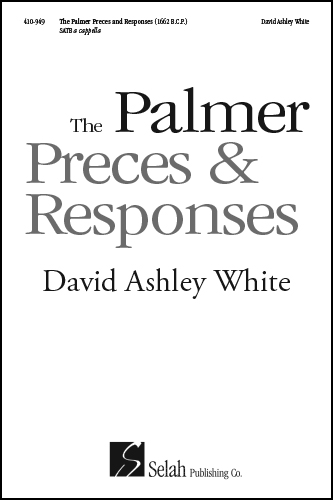|
Composer
David Ashley White
Text 1662 Book of Common Prayer
Voicing SATB, a cappella
Topic Evensong
Price $2.25 (U.S.)
Released 1/19
Catalog no. 410-949
Difficulty Mod. easy
|
Order now!
Order PDF download!
Min. of 5
Anthem text
O Lord, open thou our lips:
And our mouth shall show forth thy praise.
O God, make speed to save us:
O Lord, make haste to help us.
Glory be to the Father,
and to the Son,
and to the Holy Ghost:
As it was in the beginning,
is now and ever shall be,
world without end. Amen.
Praise ye the Lord:
The Lord’s name be praised.
The Lord be with you:
And with thy Spirit.
Let us pray.
Lord, have mercy upon us,
Christ, have mercy upon us,
Lord, have mercy upon us.
The Lord’s Prayer
O Lord, show thy mercy upon us:
And grant us thy salvation.
O Lord, save the State:
And mercifully hear us when we call upon thee.
Endue thy ministers with righteousness:
And make thy chosen people joyful.
O Lord, save thy people:
And bless thine inheritance.
Give peace in our time, O Lord:
Because there is none other
that fighteth for us,
but only thou, O God.
O God, make clean our hearts within us:
And take not thy Holy Spirit from us.
The Collects
Amen. Amen. Amen.
|
|


Description
A setting of the traditional Preces & Responses text for Evensong (1662 Book of Common Prayer text). Included is a chant-like motet setting of the Lord’s Prayer. Commissioned by the Choir of Palmer Memorial Episcopal Church, Houston, Texas for performance during its residency in Wells Cathedral, England, Brady Knapp & Courtney Daniell Knapp, directors.
Review
"David Ashley White has a distinguishing ability to create tuneful, straightforward music even while using sophisticated compositional methods, such as aleatory techniques and rhythmic intricacy. The responses he wrote for his own parish, Palmer Memorial Episcopal Church, in preparation for the choir’s residency at Wells Cathedral, breaks that mold a bit. Daring dissonances and unexpected harmonic shifts strike a much different sonic impression than is typical of his works. Yet the effortless compositional rhetoric retains his unique voice. The Lord's Prayer flows in a meterless homophonic chant governed by even eighth-note motion. The set favors D major, even while finding cadential destinations in other closely-related keys. The final "amen" cadences for the collects, however, end first on D major, then D minor, and lastly on G major. This final fortissimo chord somehow seems utterly unavoidable, as if the entire discourse were pointing to this spot all along. The harmonic interest of these responses is a very attractive element. Even with some spicy sonorities, the choral parts are of only moderate difficulty. The set makes an obvious pairing with White’s Palmer Canticles (Magnificat & Nunc dimittis)." – AAM Journal
|



